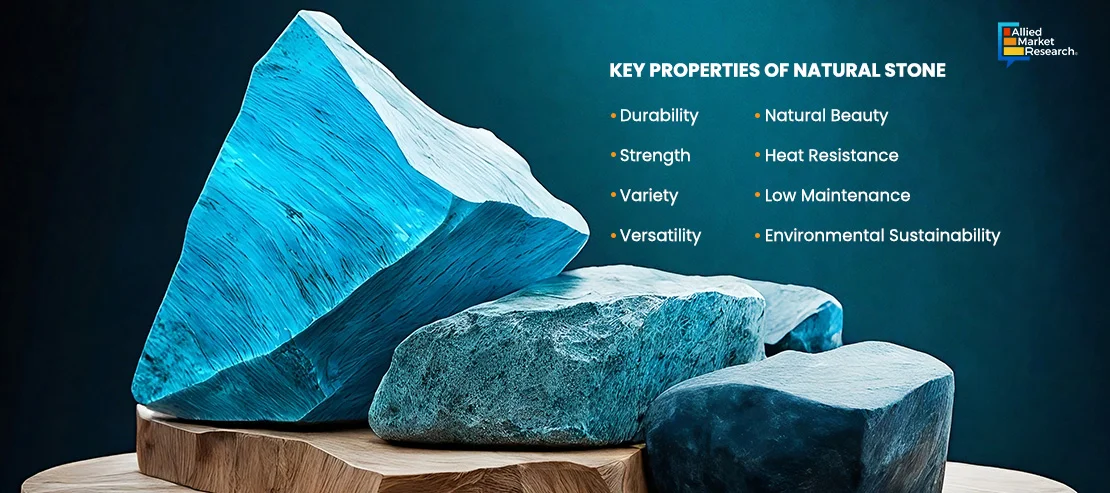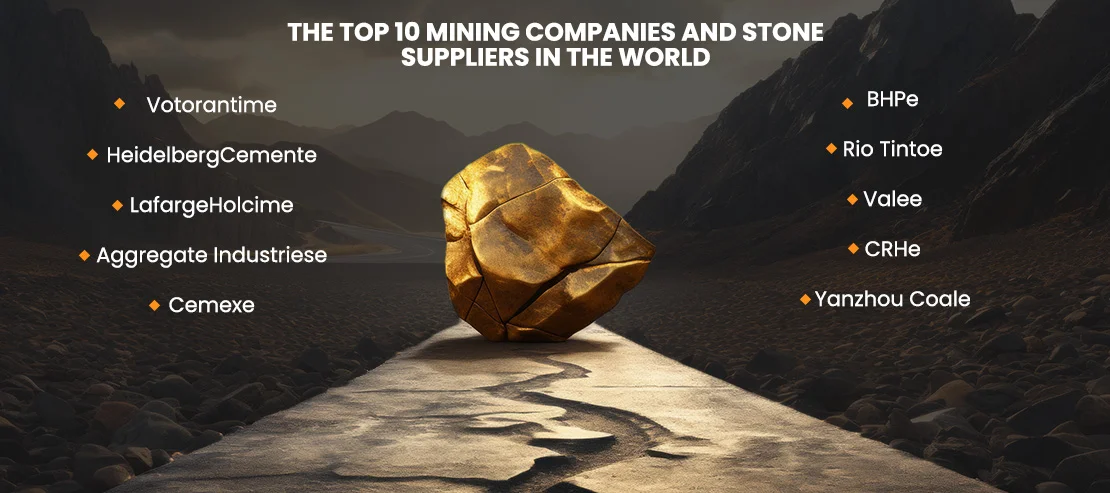Table Of Contents
- Natural Stone: Embracing Innovation Amidst Tradition
- Technological Advancements and Sustainability in Natural Stone Production
- Case Studies
- Case Study 1: Sustainable Quarrying Practices at GraniteCo
- Case Study 2: Digital Fabrication Revolutionizes Stone Processing at StoneWorks
- Case Study 3: Sustainable Design with Natural Stone at GreenTower
- Future Prospects
- Winding up

Sonia Mutreja

Koyel Ghosh
Natural Stone: Embracing Innovation Amidst Tradition

Natural Stone: Embracing Innovation Amidst Tradition
Natural stone remains popular due to its attractive appearance and durability, frequently utilized in contemporary construction and design projects. This involves getting stone from quarries all over the world, then shaping and using it in different ways.
Some of the largest natural stone quarries include the Carrara Marble Quarry in Italy, renowned for its pristine white marble used in iconic sculptures and buildings worldwide. In Brazil, the Espirito Santo region boasts vast granite quarries, supplying the global market with high-quality granite for countertops, flooring, and cladding. Meanwhile, in Rajasthan, India, there are many sandstone quarries offering various colors and textures for building and landscaping. Natural stones possess a variety of properties that make them highly desirable for various applications in construction, landscaping, and interior design.
In 2023, the global natural stone market was worth more than $60 billion and it's expected to keep growing at about 5.8% every year until 2028. The demand for natural stones is rising due to numerous residential, commercial, and township construction projects worldwide.

Technological Advancements and Sustainability in Natural Stone Production
The natural stone industry has long been marked by its blend of traditional craftsmanship and the rugged beauty of its materials. However, as sustainability becomes a high priority and as technology evolves, this sector is witnessing significant transformation. These changes are not just enhancing the efficiency and quality of natural stone production but are also steering the industry toward a more sustainable and environmentally friendly future.
One of the most significant advancements in the natural stone sector is the adoption of digital and precision technologies in quarrying and processing. Traditional methods of stone extraction, often criticized for their environmental impact and inefficiency, are giving way to more sophisticated techniques. For example, In October 2023, StoneTech introduced state-of-the-art diamond wire saws and sawing equipment in their quarry operations. These cutting-edge tools revolutionized the stone extraction process, significantly enhancing precision and efficiency while minimizing environmental impact.
By incorporating diamond-tipped wires and saws into their operations, StoneTech achieved greater accuracy and speed in cutting stone blocks, leading to reduced waste and improved resource utilization. Moreover, the company utilized drone technology and 3D mapping software to optimize quarry planning and operations, further enhancing efficiency and minimizing unnecessary excavation. StoneTech's adoption of digital and precision technologies highlights a broader trend in the natural stone industry. It involves embracing innovative solutions to address environmental concerns and enhance operational efficiency. In the realm of processing, computer-aided design (CAD) and computer numerical control (CNC) machines have revolutionized the way natural stone is cut and finished. These technologies allow for intricate designs and consistent quality at a scale previously unattainable. This precision not only caters to the high aesthetic standards of modern architecture but also reduces material waste. One notable example is MarbleWorks Inc.'s implementation of CNC technology in their stone processing operations. In January 2024, MarbleWorks announced an impressive 30% decrease in offcuts and a boost in recycling stone remnants, attributing this success to the use of CNC machines. These cutting-edge technologies have allowed MarbleWorks to achieve unparalleled precision in cutting and finishing natural stone, meeting the exacting standards of modern architecture while minimizing material waste.
Sustainability in natural stone production is another area where technological advancements are making a significant difference. Businesses are adopting sustainable practices not only to meet regulations but also because consumers are now being driven to eco-friendly products. In April 2024, GraniteTech enhanced its operations by incorporating cutting-edge water recycling technology. This innovative system recycles water used in cutting and polishing natural stone, significantly reducing the facility's freshwater consumption and minimizing wastewater discharge.
Solar-powered quarries and processing plants are emerging in this sector. MarbleGreen Inc. announced its transition to solar power for its quarries and processing plants in June 2023. By harnessing renewable energy sources, MarbleGreen aims to significantly reduce its reliance on fossil fuels and cut down on greenhouse gas emissions.
The industry is also witnessing an increase in the use of life cycle assessment (LCA) tools. These tools help manufacturers and consumers understand the environmental impact of natural stone from quarry to installation. By providing transparent data on carbon footprint, resource usage, and end-of-life recyclability, LCAs support informed decision-making and promote the use of natural stone as a sustainable building material.
Moreover, the reclamation of quarries post-extraction is an area where technological and regulatory advancements are prominently visible. Instead of leaving quarried sites barren, efforts are now made to rehabilitate these areas, with initiatives ranging from reforestation to the creation of public parks. When it mitigates the visual impact of quarrying, it also contributes to biodiversity conservation. A recent project illustrating this commitment to responsible quarry closure practices is the initiative undertaken by QuarryRevive Inc. In September 2023, QuarryRevive transformed a former quarry into a flourishing ecosystem through extensive reclamation efforts. The site, once depleted of natural resources, has now been rejuvenated into a vibrant habitat supporting diverse flora and fauna.
Case Studies
Case Study 1: Sustainable Quarrying Practices at GraniteCo
GraniteCo, a prominent stone extraction firm, encountered increasing pressure to mitigate environmental issues associated with its quarrying activities. In response, the company launched a comprehensive sustainability initiative aimed at minimizing ecological impact while maintaining operational efficiency.

Utilizing advanced technologies such as drone surveys and satellite imaging, GraniteCo optimized its quarrying processes, resulting in a 30% reduction in overburden removal. This not only lowered operational costs but also significantly reduced the company's environmental footprint.
Additionally, GraniteCo collaborated with local communities and environmental organizations to develop reclamation plans for decommissioned quarry sites. By transforming barren landscapes into thriving ecosystems through afforestation and habitat restoration efforts, GraniteCo demonstrated its commitment to environmental stewardship.
The success of GraniteCo's sustainability initiative is evident in the numbers: a 25% decrease in water usage, a 20% reduction in energy consumption, and a 15% increase in biodiversity on reclaimed quarry sites. These statistics highlight the tangible environmental benefits of implementing sustainable quarrying practices.
Case Study 2: Digital Fabrication Revolutionizes Stone Processing at StoneWorks
StoneWorks, a bespoke stone fabrication company, recognized the demand for custom-designed stone elements in architectural projects. To meet this demand while improving efficiency, the company invested in digital fabrication technologies, including CNC machinery and advanced modeling software.
By leveraging digital fabrication, StoneWorks transformed traditional stone processing methods, achieving precise customization and intricate detailing. This led to a 30% reduction in material waste and a 40% decrease in production time, resulting in significant cost savings.
One notable project where StoneWorks showcased its digital fabrication capabilities was the restoration of a historic mansion. Using digital design files, the company replicated intricate stone arches and carvings with unparalleled accuracy, preserving the architectural heritage while demonstrating the potential of digital technology in heritage conservation.
The impact of StoneWorks' digital fabrication initiative is evident in the numbers: a 20% increase in project efficiency, a 25% boost in client satisfaction, and a 15% growth in market share. These statistics underscore the transformative power of technology in the natural stone industry.
Case Study 3: Sustainable Design with Natural Stone at GreenTower
GreenTower, a LEED-certified office building designed by EcoDesign Studio, embodies sustainability principles while showcasing the timeless beauty of natural stone. The building incorporates locally sourced granite and limestone, chosen for their durability, thermal mass, and aesthetic appeal.
To minimize environmental impact, GreenTower features passive design strategies such as daylighting, natural ventilation, and rainwater harvesting. Energy-efficient HVAC systems and photovoltaic panels further reduce the building's carbon footprint, contributing to its LEED certification.
GreenTower's commitment to sustainability is reflected in its performance metrics: a 40% reduction in energy consumption, a 50% decrease in water usage, and a 20% increase in indoor air quality compared to conventional office buildings. These statistics highlight the tangible benefits of integrating natural stone with sustainable design practices.

Future Prospects
Looking ahead, the natural stone market shows promising signs of evolution, with upcoming innovations poised to reshape the industry. Technologies like digital fabrication, 3D printing, and robotic assembly are expected to streamline production processes and broaden design possibilities. Furthermore, sustainability initiatives, such as the incorporation of renewable energy sources and the adoption of circular economy practices, play a critical role in ensuring the long-term viability of natural stone as a building material. The industry is expected to keep growing, due to the increasing demand in places like Asia-Pacific and Latin America. Companies like GraniteAsia are capitalizing on this trend by expanding their operations and distribution networks. Additionally, initiatives promoting sustainable development, such as LEED certification and adherence to green building standards, are expected to boost adoption.
However, it is essential to address challenges such as supply chain disruptions and environmental concerns to maintain this growth trajectory. For example, QuarrySustain is implementing innovative solutions to minimize environmental impact and ensure responsible sourcing practices throughout their supply chains, thereby mitigating risks and enhancing long-term sustainability.
Winding up
Summing up, the natural stone market offers a blend of tradition and innovation, with opportunities for collaboration and sustainable development. By leveraging technological advancements, fostering a culture of sustainability, and addressing industry challenges, stakeholders operating in natural stone industry can ensure the continued relevance and longevity of natural stone in the built environment.
Allied Market Research stands as a trusted partner in empowering vendors to navigate and thrive in the natural stone market. Our commitment to providing comprehensive market insights, trends, and forecasts enables vendors to make informed decisions that drive growth and success. Through tailored reports, custom consulting services, and ongoing support, AMR equips vendors with the knowledge and tools needed to capitalize on the inherent advantages of natural stone. Whether identifying emerging trends, evaluating market entry strategies, or optimizing product portfolios, our team of experts provides actionable insights to help your business reach its goal. To gain more insights into the construction and manufacturing domain, contact our specialists today!

